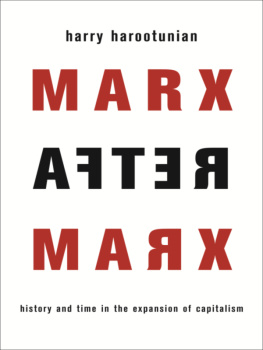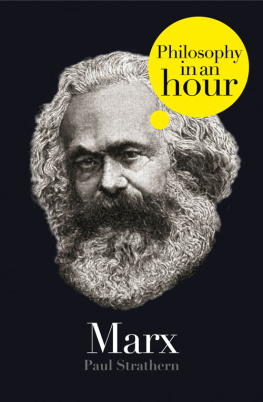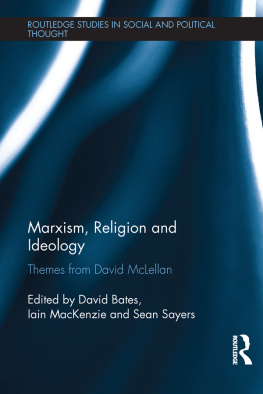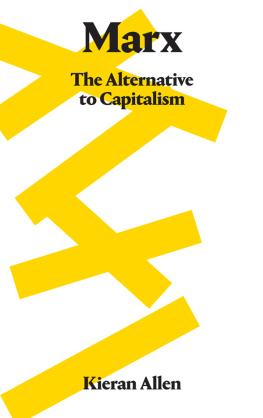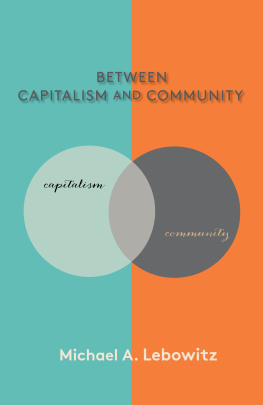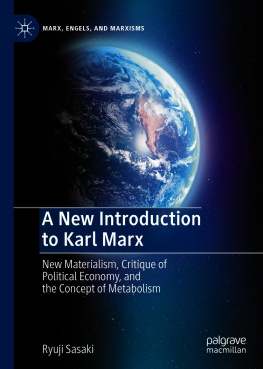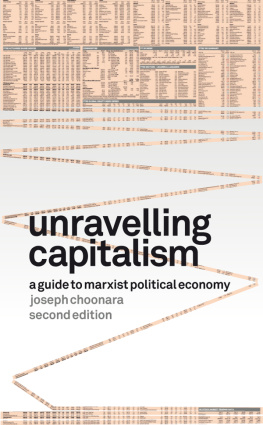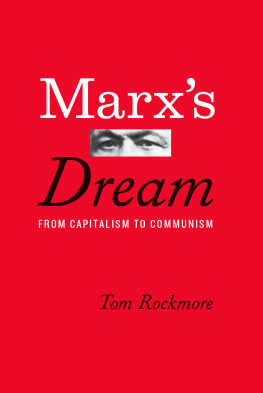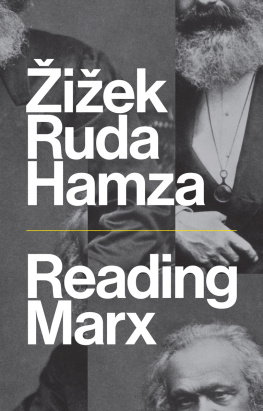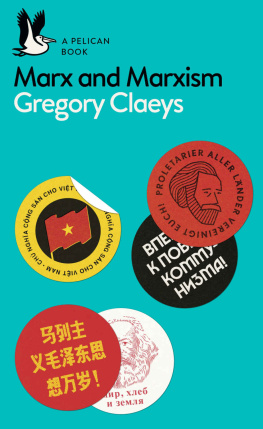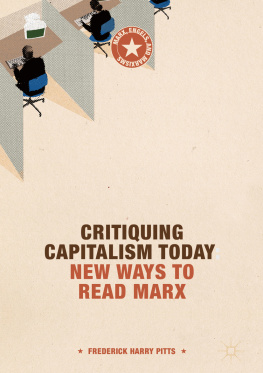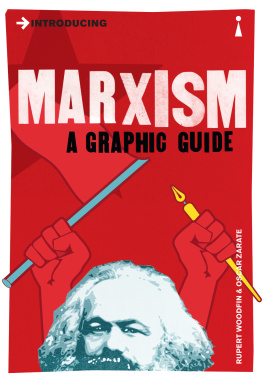MARX AFTER MARX
harry harootunian
MARX
AFTER
MARX
history and time in the expansion of capitalism
COLUMBIA UNIVERSITY PRESS New York
COLUMBIA UNIVERSITY PRESS
PUBLISHERS SINCE 1893
NEW YORK CHICHESTER, WEST SUSSEX
cup.columbia.edu
Copyright 2015 Columbia University Press
All rights reserved
EISBN: 978-0-231-54013-1
Library of Congress Cataloging-in-Publication Data
Harootunian, Harry D., 1929
Marx after Marx: history and time in the expansion of capitalism / Harry Harootunian.
pages cm
Includes bibliographical references and index.
ISBN 978-0-231-17480-0 (cloth: alk. paper)
ISBN 978-0-231-54013-1 (e-book)
1. Marx, Karl, 18181883. 2. Capitalism. 3. Socialism. I. Title.
HX39.5.H276 2015
335.4dc23
2015008490
COVER DESIGN: CHANG JAE LEE
A Columbia University Press E-book.
CUP would be pleased to hear about your reading experience with this e-book at .
For the memory of my relatives (grandparents, aunts, uncles, cousins), whose names I never knew, who perished as victims of the genocidal excesses of primitive accumulation inaugurating Turkeys drive to transform a failing imperial order into capitalist modernity. They are Walter Benjamins nameless, whose memory is honored only through an act of historical construction.
We suffer not only from the living, but from the dead. Le mort saisit le vif.
Karl Marx, Capital
CONTENTS
In the time I wrote this book, I accumulated a staggering amount of debt to people who helped me along the way. My deepest appreciation and thanks belong to Kristin Ross, with whom I discussed virtually every stage of the books unfolding and who critically read through an earlier draft, which straightened out arguments for coherence and writing for clarity. My thanks to Hyun Ok Park for the discussions weve carried on over the years on questions and approaches of mutual concern, and for reading an earlier draft. I am particularly grateful to Carol Gluck, who gave me the opportunity to teach the material that constitutes the book before it was written.
I owe a special thanks to the students enrolled in several classes I taught at Columbia University over the past six years that concentrated on Marxs writings, who ultimately gave immeasurable help in shaping the book. Id like to single out Andy Liu, Adam Bronson, Max Ward, Ramona Bajema, Jack Wilson, Norihiko Tsuneishi, and Michela Durante. I equally owe a great debt of gratitude to Ken Kawashima, not only for suggesting the books title but for our discussions over the years that have filtered into the making of the book. Thanks also go to Rebecca Karl for her inestimable knowledge of Chinas modern history, which Ive drawn on, and for letting me use the draft of her invaluable essay on Wang Yanan and to Massimiliano Tomba for his important reading of Marxs conception of time.
Thanks too to Hayden White for his critical reading of the early chapters of the book; to Manu Goswami for useful advice and observations based on her command of Marxs texts; to William Haver and Michael Dutton for their generous responses from which I learned a great deal; and to Viren Murthy, whose mastery of Japanese and Chinese intellectual history and Marxism has been an incomparable source of support.
I want to remember Joyce Liu, director and professor of the Graduate Institute for Social Research and Cultural Studies, National Chiao Tung University, Taiwan, for inviting me to deliver a keynote at an International Conference on East Asian Marxisms, which happened to be my first run-through of the problem of deprovincializing Marx. My thanks to the Literature Program of Duke University, and especially Michael Hardt, Rey Chow, and Fredric Jameson, for the opportunity to present the substance of the book at a workshop at the Franklin Center in spring 2013. Thanks also to Anne Allison and Chris Nelson and their colleagues, and to Charlie Piot for a second invitation to present my current work in a workshop (winter 2015); to Katsuya Hirano and William Marotti and their graduate students at UCLA (October 2013) for the opportunity to speak on some of the intellectual and historical issues Ive been concerned with in my career; to Moishe Postone, William Sewell, and the Social Theory Workshop at the University of Chicago (February 2012), where I spoke on the problem of deprovincalizing Marx; and to Naoyuki Umemori and his colleagues at Waseda University, Tokyo, for asking me to speak on my current research (November 2014).
Finally, my thanks to the staff of the Columbia University Press, who have eased the path to publication and made it a genuinely pleasant experienceespecially Jennifer Crewe, the director of the press; Kathryn Schell, my editor; and Anita OBrien for her wonderful copy editing. I want also to express appreciation to the Schoff Fund at the University Seminars at Columbia University for its help in publication. The ideas presented have benefited from discussions in the University Seminars on Modern Japan.
In this narrative the importance of labor has been demoted to residual status, since, as Massimiliano Tomba explains, value is made to appear to proceed directly from the productive process and consumption, and its culture is elastically expanded to fill every pore of society and inform all human activity.
This perspective on Marx was in part produced by the so-called Frankfurt Schools earlier (prewar) intervention and appropriation of Lukcss analysis of reification and its successive expansion into cultural disciplines, as well as being reinforced in the later work of Antonio Negri and his followers, who have presumed the final completion of the commodity relation everywherethe putative realization of real subsumptionto reaffirm capitalisms own self-image in the pursuit of progress. Both cases share the common ground of this changed perspective that assumes capitalisms final externalization and naturalization, where it has subsumed the whole of society. With Frankfurt Marxism, it is the explicit transfer to circulation, whereas in Negri, productive labor is envisioned as intellectual and immaterial, expressed now in the sovereign subject of the General Intellect. What both commonly propose are the unimportance or secondary stature of industrial labor, as such, and the expansion of the commodity relation to mediate all sectors of society. Both, moreover, submitted history to process, a sort of auto-reflection. Unilinear historical progress allowed the measuring of the level of (Western) civilization attained by populations with histories different from those of Europe, thus justifying the domination of those who were represented as lower down the scale. Deprovincializing Marx entails not simply an expanded geographic inclusion but a broadening of temporal possibilities unchained from a hegemonic unlinearism.

